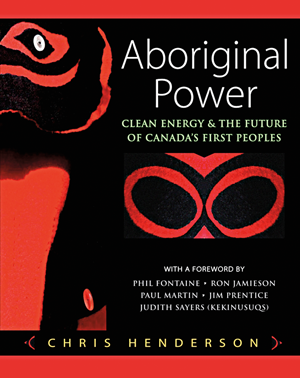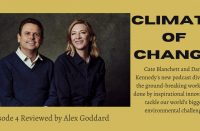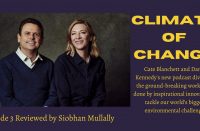When breaking new ground, it’s quite common to find oneself in muddy water. Aboriginal Power is all about how Indigenous Peoples in Canada have broken new ground by entering the renewable energy foray, sometimes in a big way.
When breaking new ground, it’s quite common to find oneself in muddy water. Aboriginal Power is all about how Indigenous Peoples in Canada have broken new ground by entering the renewable energy foray, sometimes in a big way.
This is not a topic that has received widespread coverage, as the developments are often slow and don’t fit into common narratives besides the “Ecological Indian.” Chris Henderson argues that shrewd business acumen, more than an environmental ethos, is the propelling force in many of these projects, and Aboriginal Power deserves praise for exploring a new and timely topic.
At times the book struggles to determine its audience. There is enough explanation of the basics of renewable energies, Aboriginal politics around energy projects, and government and business practices for the lay reader. At other times the book dives deep into the framework of how each element of an energy deal needs to be written (including a few pages that explain what role a clean-energy advisor should play), which could overwhelm readers without an interest in actually getting into the business. The book also includes an abundance of glossy, full-colour graphs, flow charts, tables and other business infographics, occasionally making it feel like a business textbook.
For Henderson’s apparent intended target – Aboriginal community leaders, clean-energy practitioners and interested politicians – it is an invaluable resource. It includes crucial information about how to negotiate any kind of agreement, how to find financing, the basis of the duty to consult and accommodate, what recourse bands have if projects are going ahead without their support, and so on. A number of Aboriginal leaders also contribute written sections of the book, providing unique perspectives on the role of renewable energy and their experiences managing it.
Henderson is strongest when playing up the benefits to all sides in these deals, making it seem entirely feasible for any community, project partner or government to all come together and come to a fair agreement. Aboriginal Power can make you feel like an insider with its thorough treatment of the material.
Henderson acknowledges that First Nations quite often receive less-than-fair dealings. This is a situation he suggests can mainly be remedied by hiring a clean-energy advisor, which he admits to being. In one section of the book, he lists a number of lawyers, energy experts and other consultants and advisors. It isn’t clear if this is meant to be an exhaustive list of the main practitioners in a limited field, or simply a list of people and businesses the author happens to know. (It’s a helpful list for practitioners, but raises questions, especially in a section that lauds transparency in First Nations’ dealings.)
The main weakness that emerges in Aboriginal Power is a reticence to fully explore some of the complexities and divisions that are a reality in Indigenous societies. Having myself worked with a number of communities opposed to hydro and other projects imposed on them, the book makes it sound too easy to develop these projects.
Understanding complexity is necessary to truly make clean-energy projects successful and sustainable in the long term. The book suggests projects go beyond “consultation and accommodation” but doesn’t go so far as promoting Free, Prior, and Informed Consent, an international standard enshrined in the UN Declaration on the Rights of Indigenous Peoples that many First Nations are pushing for to bolster their support for these kinds of projects.
Overall, and despite some slightly muddied waters, Aboriginal Power is an important contribution to conceptualizing the world of clean energy as a potential place to break new ground in relationships with Indigenous Peoples. It will serve as a starting point in a conversation that is very much just beginning.
Aboriginal Power: Clean Energy & The Future of Canada’s First Peoples, Chris Henderson, Erin, Ontario: Rainforest Editions, 2013, 206 pages.
Reviewer Information
Ben Powless is a First Nations citizen with a degree in Human Rights, Native Studies and Environmental Studies from Carleton University. He has worked on climate change, Indigenous rights and tar sands issues with the Indigeneous Environmental Network, Defenders of the Land, Idle No More, Canadian Youth Climate Coalition and Ecology Ottawa.












